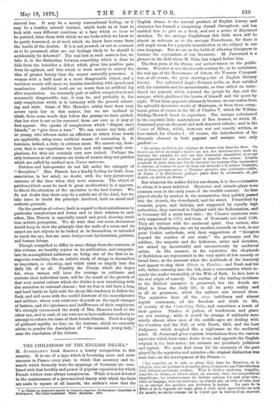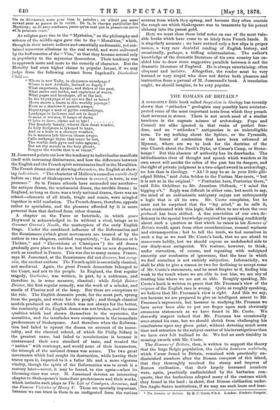THE CHILDHOOD OF THE ENGLISH DRAMA.*
M. JUSSERAND'S book deserves a hearty recognition in this country. It is one of a type which is becoming more and more common in France every year, in which that accuracy and re- search which formerly were the appanage of Germany are com- bined with that lucidity and power of popular exposition for which French writers were always conspicuous. While it is not devoted to the maintenance of a preconceived theory with which the facts are made to square at all hazards, the author's view that the • Le Theatre en Angleterre depuis Ia Conguite jusgu'aux Predicesseurs Immedials de Saakeepeare. Par Jules Jussenmd. Paris: Hachette. 1878.
English drama is the natural product -of English history and character has formed a connecting thread throughout, and has enabled him to give us a book, and not a series of disjointed sketches. To the average Englishman this little work will be almost as welcome as to the average Frenchman, for there is still ample room for a popular introduction to the subject in our own language. But we are in the habit of allowing foreigners to become the expounders of our literature. M. Jusserand is a gleaner in the field where M. Taine has reaped before him.
The first germ of the Drama our author traces to the public shows. Whether or not theeleventh century be, as he maintains, the real age of the Renaissance of letters, the Norman Conquest was, at all events, the great starting-point of English literary history. The cultivated Anglo-Norman noble, at first satisfied with his minstrels and his mountebanks, as time rolled on intro- duced the pageant, which rejoiced the people by day, and the masque, which gladdened the hearts of himself and his peers by night. What these pageants ultimately became, we can realise from the splendid decorative works of Mantegna, or from those sump- tuous prints of events in the life of Charles V. which Sir William Stirling-Maxwell loved to reproduce. The masque culminated in the exquisite little masterpieces of Ben Jonson, to which M.
Jusserand pays an eloquent and well-deserved tribute ; and in the Counts of Milton, which, however, was not exactly written, as here stated, for Charles I. Of course, the introduction of the dramatic element in both pageant and masque was only gradual :—
" De me,me, en Greco, lee origines du drama sent dans lee fates. On trouve au dabnt de simples danses an son dos instruments ; mais an bercean des peuples, lea arts out tine connexion singnliero, et co cmf fait progressor lee tins accelere aussi la marche des autres. L'envie gendrale de jouir dans tine fete fit chorcher lee moyens d'en augmenter le charme, et comme le goat du beau est inherent a la nature humaine, quo le beau procure, memo It l'hotnme grassier, nub jouissance on donna a Is litttcrature quelque place dans la cdrrSmonie, et, par degree, on arrive an drame."
But whatever the nobles did for our drama, it is the ecclesiastics to whom it is most indebted. Mysteries and miracle-plays were common even in the early years of the twelfth century. At first played chiefly by novices in the monasteries, they quickly passed into the church, the churchyard, and the street. Proscribed by councils, popes, and bishops, and supported by equally high authorities, they survived in England until the Reformation, and in Germany till a much later date ; the Chester mysteries were only suppressed in 1574, and those of Newcastle not until 1598.
They are instinct with the medireval spirit. Our author, who- delights in illustrating one art by another, reminds us how, in our great Gothic cathedrals, with their suggestions of "thoughts beyond the reaches of our souls," the grotesque and the sublime, the majestic and the ludicrous, satire and devotion, are mixed up inextricably and unconsciously by medireval artists. In like manner, in the mysteries, the shepherds of Bethlehem are represented in the very spirit of low comedy or broad farce, at the moment when the multitude of the heavenly host appear to sing their Gloria in Excelsis ; and Noah and his wife, before entering into the Ark, have a conversation which re- minds the reader irresistibly of the Wife of Bath. In fact, here is
the real origin of comedy. The outline of the leading incidents in the Biblical narrative is preserved, but the details are filled in from the daily life, in all its petty reality and
in all its grossness, which the authors saw around them. The mysteries have all the naive indelicacy and almost impish coarseness, all the freedom and truth to life, of certain of the Canterhury Tales, and sometimes a touch of their genius. Flashes of pathos, of tenderness, and grace are not wanting ; while it would be strange if sublimity were wholly absent, when men of the middle-ages are dealing with the Creation and the Fall, or with Death, Hell, and the Last Judgment, which weighed like a nightmare on the media3val mind. M. Jusserand gives copious translations from the various mysteries which have come down to us, and appends the English original in the foot-notes ; his extracts are peculiarly judicious and typical. We must find room for his summary of the part
played by the mysteries and miracles—the original distinction was soon lost—in the development of the Drama :— " La comadie, on In voit, se gliese daja dans lee Mysteres, at la religion, tout en gardant in premiere place, n'empeche pas 'Introduction, d'un elament purement profane. Tout le thdatro moderns, tragadie, comaie, at drame, so trouvo ainsi, on essence, dans ces compositions singulieres ; les raminiscences du thdatre antique n'y mut pour rim ; idees et 'engage, tout eat nouveau ; on n'imite pas, on era°, at cola, tout on se servant des modeles quo priisente In nature. La part de la Bible at de la lagende eat large, mais, h cota, nous apercovons nn coin du monde, an moms comma on le voyait par la fenetre d'un convent..
On en ddconorait assez pour bien le peindre ; on n'etait pas assez savant pour se passer de is vdritd. De lh, Is eharme particulier des Mysteres; on lit avec °enflame, parce qu'on sent quo la pens6e eat naive et la peinture vraie."
As religion gave rise to the "Mysteries," so the philosophy and science of the middle-ages gave rise to the "Moralities," which, though in their nature tedious and essentially undramatic, yet con- tained numerous allusions to the real world, and were enlivened by the buffooneries of the "Vice," so that they became second only in popularity to the mysteries themselves. Their tendency was to approach more and more to the comedy of character. But the Morality had even higher claims to popular favour, if we may
judge from the following extract from Ingelend's Disobedient
Child :—
" Where is now Tully, in eloquence excedynge?
Where is now Aristotle, learned so depely ? What emperonrs, kynges, and dukes of the past, What caries and lordes, and captaines of warns, What popes and bysshopes, all at the last, In the twynkynge of an eye are fled so farre ? Howe shorte a feaste is this worldly joyenge ! Even as a shadowe it passeth awaye, Depryvynge a man of gyftes everlastynge, Leadynge to darkenes and not to daye ! 0 meat of wormes, 0 heaps of dnste,
o lyke to dewe, clyme not to bye'
The flesshely beauty, wherat thou doest wonder, In holy Scripture is lykened to hayo, And as a kale in a stormye weather, So is mannes lyfe blowen cleans awaye. Calle nothynge thyne that maye be lost, The worlde doth gyve and take agayne ; But set thy mynde in the holy ghosts, Despyse the worlde that is so vayne."
M. Jusserand points out how the tendency to individualise manifests itself with increasing distinctness, and how the difference between the English and the French spirit accentuates itself in the Moralities. The French drama aims at showing characters, the English at show- ing individuals. "The character of Moliere's comedies unrolls itself before us ; that of Shakespeare's heroes is created, is born, in our presence." So in France schools have succeeded one another— the antique drama, the sentimental drama, the terrible drama ; in England, so long as there was a truly national drama, there was no school—elements of all kinds, tragic and comic, were mingled together in wild confusion. The French drama, therefore, appeals rather to specialists, and the pleasure afforded by it is more personal than that derived from other dramas.
A chapter on the. Farce or Interlude, in which genre Heywood is acknowledged to be without a rival, brings us to Gammer Gurton's Needle, the masterpiece of the early English Stage. Under the combined influence of the Reformation and the Renaissance (which great movements are treated of by the author in two chapters, entitled respectively, "La Reforme et le Theatre," and " Theoriciens et Classiques ") the old drama gradually gave place to the new, but there was no new departure, such as resulted in France. This was due to many causes. France, says M. Jusserand, at the Renaissance did not discover, but recog- nise, the ancient authors The French spirit is essentially classical, not medimval. Again, the great French dramatists belonged to the Court, and not to the people. In England, the first regular tragedy, Gorboduc, was written, in part, by a nobleman, and therefore is, in some measure, classical ; while Ralph Roister Doister, the first regular comedy, was the work of a scholar, and smells of Plautus and of the lamp. But these are exceptions to the rule. The English dramatic poets, for the most part, sprang from the people, and wrote for the people ; and though classical models produced an effect which was not always for the better, the continuity of the English drama was not broken, and the same qualities which had shown themselves in the mysteries, the moralities, and the interludes were conspicuous in the immediate predecessors of Shakespeare. And therefore when the Reforma- tion had failed to uproot the drama on account of its immo- rality, and the classical school, of which Sir Philip Sidney is the greatest name, had failed to revolutionise it because it contravened their own standard of taste, and treated the '‘ unities " with contempt, and would none of their hexameters, the triumph of the national drama was secure. The two great movements which had sought its destruction, while leaving their traces upon it, imparted to it a fuller life and a more vigorous vitality, though the spirit of the Reformation was to crush it a century later—never, it may be feared, to rise again—when its blooming-time was over. M. Jusserand devotes an interesting chapter to Shakespeare's immediate predecessors and their works, which includes such plays as The Life of Cambyses, Jeronimo, and the Famous Victories of Henry V. These are specially important, because we can trace in them in an undigested form the various
sources from which they sprang, and because they often contain the rough ore which Shakespeare was to transmute by his potent alchemy into the purest gold.
Here we must close these brief notes on one of the most valu- able books which have come to us lately from French hands. It is singularly accurate ; we have noticed only a few slips in proper names, a very rare doubtful reading of English history, and occasionally, perhaps, a trifling mistranslation. The author's knowledge of the dramatic literature of his own country has en- abled him to draw some suggestive parallels between it and the dramatic literature of England. He is always entertaining, often eloquent and incisive. Altogether, the reader must be very learned or very stupid who does not derive both pleasure and instruction from a perusal of M. Jusserand's book. A translation ought, we should imagine, to be very popular.



































 Previous page
Previous page